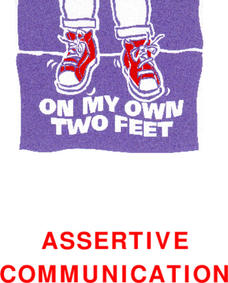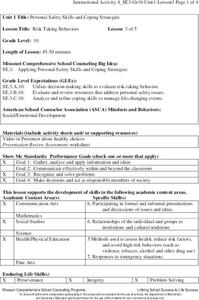MD Anderson Cancer Center
Tobacco Free Teens
Clear the smoke about cigarette use with an engaging application. Comic strip animation and games teach learners why they should never try smoking in the first place, and how to quit this lethal habit if they have already been lured in.
Missouri Department of Elementary
How Much Does Smoking Really Cost?
Following a brief survey about tobacco, scholars examine a fact sheet to answer questions about the substance. A practice page challenges the class to determine the cost of the habit using money math. Pupils discuss their findings...
PBS
Opioids in Our Community—Middle School
How do opioids affect the lives of families and individuals within a community? Scholars explore the topic with a series of informative, thought-provoking videos. They also complete worksheets and discuss the effects of the opioid...
Centers for Disease Control and Prevention
Electronic Cigarettes: What's the Bottom Line?
A five-page infographic unveils the ins and outs of e-cigarettes. Numerous bullet points and pictures detail what e-cigarettes are, the ingredients found inside, and the health effects of using them.
Department of Education (Ireland)
Assertive Communication
Assertive communication is an acquired skill. Teaching young people to ask for what they need and to believe that they have a right to ask is at the core of a unit on assertive communication. Over the course of the unit, middle and high...
Baylor College
What Is a Neuron?
Your class won't get on your nerves while doing this modeling activity! After teaching the structure and function of a neuron using the included diagrams, give individuals some clay and chenille stems so that they can make their own...
Health Smart Virginia
Surviving High School Awareness Campaign
To demonstrate what they have learned in the Health Smart unit, sophomores design a resource for incoming ninth-graders that includes what they consider the most important information they gleaned from one of the eight topics studied.
National Institute of Drug Abuse
Nurturing My Mental and Emotional Health
One exercise does not necessarily work for all! A resource from the National Institutes of Health provides tweens and teens with exercises to help them cope with anxiety and stress. Participants note their stress levels before and after...
Department of Education (Ireland)
Understanding Influences
"Understanding Influences," a richly detailed, carefully scaffolded unit, asks middle and high school scholars to examine how internal and external factors like friends, media, and society influence their attitudes and behaviors.
Missouri Department of Elementary
Risk Taking Behaviors
Sophomores can be sometimes wise and sometimes foolish. The same can be said for their behaviors. After watching a presentation about risk taking behaviors, class members discuss the presentation in small groups, and then complete a...
American Psychological Association
Developing Adolescents
Why to young people act the way they do? Scholars investigate the stages of adolescent development incorporating high school psychology techniques. Using research from the American Psychological Association, they uncover the five areas...
Curated OER
ACLU
Is the American Civil Liberties Union (ACLU) good for America? The informative website is a one-stop shop for ACLU debate resources. Scholars read about the topics surrounding the issue, including free speech, national security, and...
Utah State Courts
Judges in the Classroom
Class members explore the process of a disposition hearing for juveniles, particularly looking at how the judge decides what sentence the juvenile offender should receive. Task your pupils with evaluating different sample cases provided...
Other popular searches
- Drug Abuse Posters
- Drug Abuse Lesson Plans
- Alcohol and Drug Abuse
- Drug Abuse Prevention
- Prescription Drug Abuse
- Effects of Drug Abuse
- Drug Abuse Play
- Drug Abuse Projects
- Drug Abuse Survey
- Drug Abuse and Prevention
- Drug Abuse Factors
- World Drug Abuse














